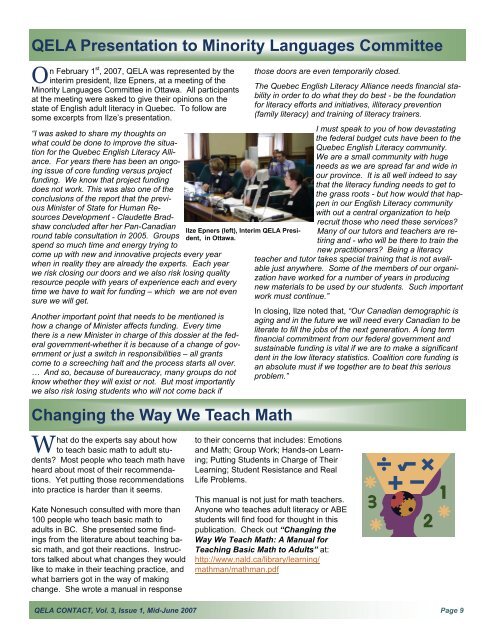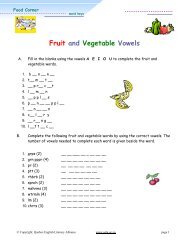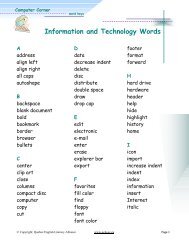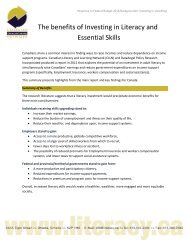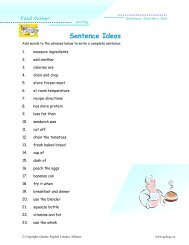June 2007 - Quebec English Literacy Alliance
June 2007 - Quebec English Literacy Alliance
June 2007 - Quebec English Literacy Alliance
You also want an ePaper? Increase the reach of your titles
YUMPU automatically turns print PDFs into web optimized ePapers that Google loves.
QELA Presentation to Minority Languages Committee<br />
O n February 1st , <strong>2007</strong>, QELA was represented by the<br />
interim president, Ilze Epners, at a meeting of the<br />
Minority Languages Committee in Ottawa. All participants<br />
at the meeting were asked to give their opinions on the<br />
state of <strong>English</strong> adult literacy in <strong>Quebec</strong>. To follow are<br />
some excerpts from Ilze’s presentation.<br />
“I was asked to share my thoughts on<br />
what could be done to improve the situation<br />
for the <strong>Quebec</strong> <strong>English</strong> <strong>Literacy</strong> <strong>Alliance</strong>.<br />
For years there has been an ongoing<br />
issue of core funding versus project<br />
funding. We know that project funding<br />
does not work. This was also one of the<br />
conclusions of the report that the previous<br />
Minister of State for Human Resources<br />
Development - Claudette Bradshaw<br />
concluded after her Pan-Canadian<br />
round table consultation in 2005. Groups<br />
spend so much time and energy trying to<br />
come up with new and innovative projects every year<br />
when in reality they are already the experts. Each year<br />
we risk closing our doors and we also risk losing quality<br />
resource people with years of experience each and every<br />
time we have to wait for funding – which we are not even<br />
sure we will get.<br />
Another important point that needs to be mentioned is<br />
how a change of Minister affects funding. Every time<br />
there is a new Minister in charge of this dossier at the federal<br />
government-whether it is because of a change of government<br />
or just a switch in responsibilities – all grants<br />
come to a screeching halt and the process starts all over.<br />
… And so, because of bureaucracy, many groups do not<br />
know whether they will exist or not. But most importantly<br />
we also risk losing students who will not come back if<br />
Changing the Way We Teach Math<br />
hat do the experts say about how<br />
W to teach basic math to adult students<br />
Most people who teach math have<br />
heard about most of their recommendations.<br />
Yet putting those recommendations<br />
into practice is harder than it seems.<br />
Kate Nonesuch consulted with more than<br />
100 people who teach basic math to<br />
adults in BC. She presented some findings<br />
from the literature about teaching basic<br />
math, and got their reactions. Instructors<br />
talked about what changes they would<br />
like to make in their teaching practice, and<br />
what barriers got in the way of making<br />
change. She wrote a manual in response<br />
Ilze Epners (left), Interim QELA President,<br />
in Ottawa.<br />
those doors are even temporarily closed.<br />
The <strong>Quebec</strong> <strong>English</strong> <strong>Literacy</strong> <strong>Alliance</strong> needs financial stability<br />
in order to do what they do best - be the foundation<br />
for literacy efforts and initiatives, illiteracy prevention<br />
(family literacy) and training of literacy trainers.<br />
I must speak to you of how devastating<br />
the federal budget cuts have been to the<br />
<strong>Quebec</strong> <strong>English</strong> <strong>Literacy</strong> community.<br />
We are a small community with huge<br />
needs as we are spread far and wide in<br />
our province. It is all well indeed to say<br />
that the literacy funding needs to get to<br />
the grass roots - but how would that happen<br />
in our <strong>English</strong> <strong>Literacy</strong> community<br />
with out a central organization to help<br />
recruit those who need these services<br />
Many of our tutors and teachers are retiring<br />
and - who will be there to train the<br />
new practitioners Being a literacy<br />
teacher and tutor takes special training that is not available<br />
just anywhere. Some of the members of our organization<br />
have worked for a number of years in producing<br />
new materials to be used by our students. Such important<br />
work must continue.”<br />
In closing, Ilze noted that, “Our Canadian demographic is<br />
aging and in the future we will need every Canadian to be<br />
literate to fill the jobs of the next generation. A long term<br />
financial commitment from our federal government and<br />
sustainable funding is vital if we are to make a significant<br />
dent in the low literacy statistics. Coalition core funding is<br />
an absolute must if we together are to beat this serious<br />
problem.”<br />
to their concerns that includes: Emotions<br />
and Math; Group Work; Hands-on Learning;<br />
Putting Students in Charge of Their<br />
Learning; Student Resistance and Real<br />
Life Problems.<br />
This manual is not just for math teachers.<br />
Anyone who teaches adult literacy or ABE<br />
students will find food for thought in this<br />
publication. Check out “Changing the<br />
Way We Teach Math: A Manual for<br />
Teaching Basic Math to Adults” at:<br />
http://www.nald.ca/library/learning/<br />
mathman/mathman.pdf<br />
QELA CONTACT, Vol. 3, Issue 1, Mid-<strong>June</strong> <strong>2007</strong> Page 9


